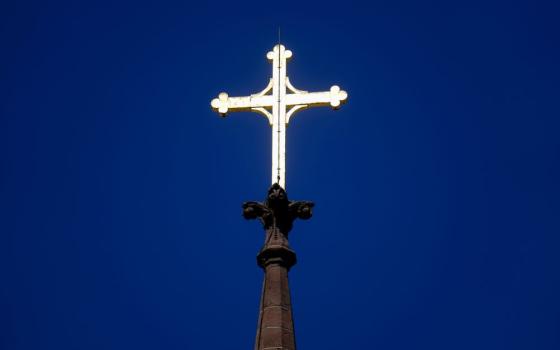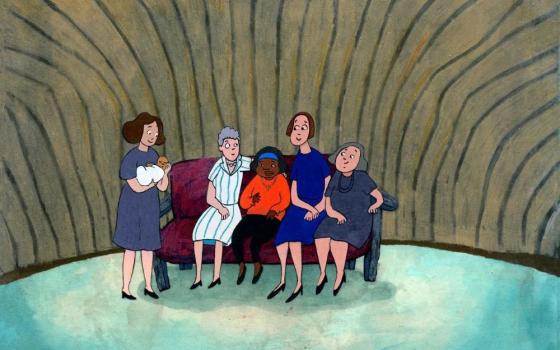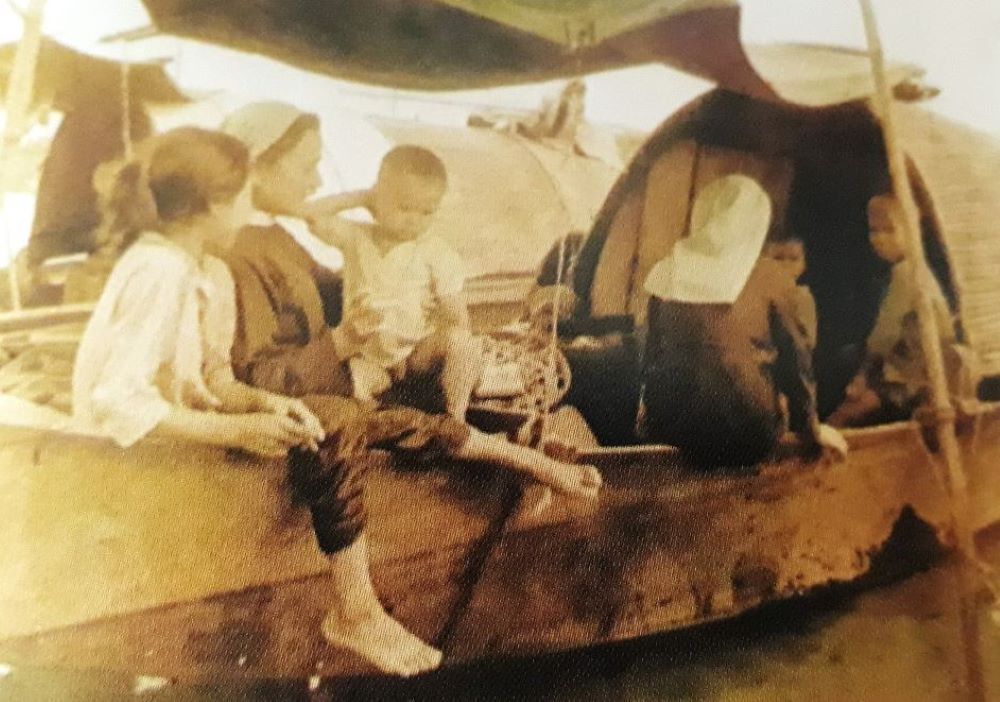
Two Daughters of Our Lady of the Visitation visit people living on a boat in a river in Hue in 1970. (Courtesy photo)
Even at age 80, Daughters of Mary of the Immaculate Conception Sr. Mary Consolata Bui Thi Bong cannot shake off the haunting memories of the days when Vietnam fell into chaos 50 years ago.
In March 1975, as Northern communist forces swept through the central provinces, panic gripped the people of Hue, the southernmost coastal city in the North Central Coast region.
Bong recalled how desperate families in Hue scrambled to flee. Catholics rented fishing boats to cross the sea to the neighboring city of Da Nang. Soldiers loaded their families onto crammed vehicles — people were packed in like sardines, clutching what little they could carry.
All religious congregations and seminaries in the Archdiocese of Hue were ordered to evacuate. About 150 sisters from Bong's congregation dispersed, some traveling with family, others in groups, bound for southern provinces and the capital of Saigon, Bong said. Only 11 elderly sisters were left behind to watch over the motherhouse.
Bong said she and eight other sisters managed to escape to Da Nang by boat. But the journey took a toll — most suffered from severe seasickness, and three fainted. They found temporary refuge in a church school alongside dozens of displaced families.
"I saw bodies lying lifeless in the streets, others wounded, while crowds looted shops for survival," Bong said.
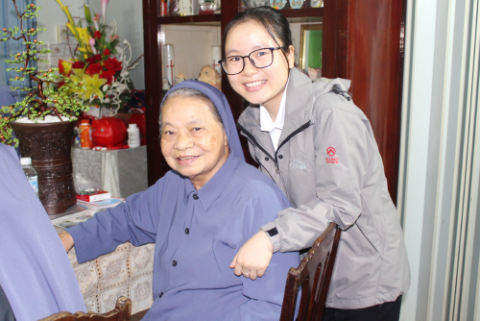
Lovers of the Holy Cross of Hue Sr. Mary Nguyen Thi Tuyet and a young nun pose for a photo on April 15. (GSR photo)
Just a week before Hue officially fell on March 26, the remaining sisters joined the tide of terrified refugees pouring into Da Nang.
The motherhouse, which had existed since 1920, stood empty, Bong recalled – until she and others returned in early April after the region was "liberated."
"We lived in constant fear and confusion while trying to clean up the ruins of the convent," she said.
Bong recalled that by mid-April, Archbishop Philippe Nguyen Kim Dien of Hue informed the nuns that a military regiment had requisitioned their convent on a 2-hectare (5-acre) lot as barracks. He later advised them to move to the Discalced Carmelites' monastery next door, where only a few aging nuns remained.
"We were stunned and heartbroken, but we had no choice but to obey," Bong said.
Merry School, a state-run kindergarten in Hue, was a former high school run by the Daughters of Mary of the Immaculate Conception before 1975. (GSR photo)
Vietnam celebrated the 50th anniversary of "the Liberation of the South and National Reunification," on April 30 with fireworks, drone shows, parades and a five-day national holiday.
But for those who lived through it, the memories are anything but celebratory. About noon on April 30, 1975, Northern communist tanks rolled into Saigon, the capital of the U.S.-backed South Vietnam. The tanks broke through the gates of the presidential palace, bringing two decades of bloodshed to a close. More than 58,000 Americans, 200,000 South Vietnamese troops, over 1 million communist fighters and 2 million civilians had died.
In the war's wake, religious life in the South was turned upside down. The communist regime nationalized, "borrowed" or shut down nearly all church-run institutions — seminaries, schools, hospitals, orphanages, banks and even convents. Many chapels and churches were seized or shuttered.
Bong recalled that the communist regime sent many clergy and religious to re-education camps. Religious practice was severely restricted, travel was curtailed, and Catholics were barred from universities and public service jobs. Urban dwellers were shipped to remote areas to work, while food and essentials were rationed.
Dien, the archbishop, initially urged cooperation with the new government, hopeful for national healing. But as repression mounted, he spoke out forcefully against violations of religious freedom and human rights.
"Two years have passed, but I still don't feel we have true religious freedom," Dien said on April 15, 1977, according to church documents.
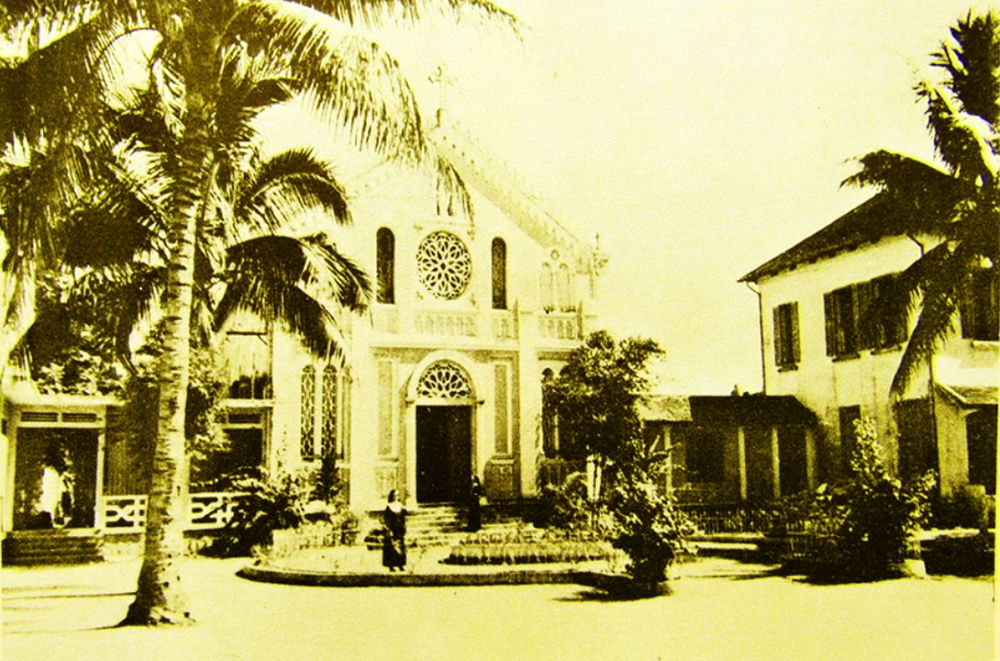
The chapel and convent of the Daughters of Mary of the Immaculate Conception before 1975 (Courtesy photo)
Dien criticized the restrictions on pastoral care, including travel to communities in remote areas. Catholics, he warned, were being treated like second-class citizens.
Dien refused to allow priests to join the state's National Catholic Liaison Committee (or Committee for Solidarity of Vietnamese Catholics), a tool used to promote government policy and interfere with the church. The government summoned him to the police station, barred from pastoral visits, episcopal meetings, and even from attending ad limina visits to the Vatican. He was placed under house arrest from 1984 until he died 1988.
Fr. Andrew Tran Duc Duy, an expert in Vietnamese church history, told GSR that the archdiocese covering the provinces of Quang Binh, Quang Tri and Thua Thien Hue lost about 70 properties and 2,000 hectares (4,942 acres) of land. Fourteen military chaplains were imprisoned.
Bong said her congregation's 38 communities were dissolved, and 35 schools, clinics, orphanages and dormitories were confiscated. Two sisters abducted by communist forces in 1967 remain missing to this day.
She recalled that then superior Sr. Mary Gonzaga Do Thi Tung filed countless petitions to reclaim their motherhouse. For her efforts, she was summoned more than 15 times and detained twice by officials, pressured to sign over the property, Bong said.
"She told them, 'You can kill me or imprison me, but I will never sign,' " Bong said. " 'The property belongs to the congregation — not just to me.' "
The government refused to give it back.
Sr. Mary Consolata Bui Thi Bong, Buddhist monks and others meet for social work at Hai Duc Pagoda in Hue in October 2024. (GSR photo)
Lovers of the Holy Cross of Hue Sr. Mary Nguyen Thi Tuyet said most sisters fled early in 1975, while the elderly chose to stay behind and guard their convents.
She added that more than 30 of their properties were seized and turned into schools, clinics or given to civilians. Six sisters died in the war, and two superiors were jailed for defending their rights and working for Dien, she said.
Tuyet said that between 1972 and 1975, many Daughters of Our Lady of the Visitation relocated to Dong Nai province, where their families lived and built shelters from bamboo and thatch, farmed rubber, and cleared jungle land.
Sr. Anna Le Thi An, 77, recalled many suffered from stomach ulcers and malaria and had only limited access to power.
An, a social worker, said life was harsh. Some novices left the convent. Four sisters died from exhaustion while being forced to dig irrigation channels and reclaim land.
"But we held on and comforted one another, determined to remain faithful to our calling," she said.
By April 1976, An said, 40 sisters returned to Hue to rebuild what was left. They lived off poultry farming, vegetable gardening and crafting leaf-conical hats. They ministered during Easter, Christmas or the Marian month of May. Some staying at people's houses, however, were prevented from leading liturgical services without state permission.
The congregation's six institutions were never returned.
Advertisement
St. Paul de Chartres Sr. Marie Monique Van Thi Thuc said eight French nuns were expelled after the war. Vietnamese sisters had to farm for survival, and many were forced to farm in remote areas. Eight died from exhaustion, she said.
Thuc believes government restrictions crippled vocations. "Young aspirants were sent home by security officers for not having permission," the 62-year old nun said. Sisters posed as teachers in remote parishes, quietly forming new vocations under the radar.
For years, Bong said, they lived off cassava and sweet potatoes. Pastoral work was stifled. Young women were discouraged — or outright forbidden — from joining religious life.
Still, they found ways to fit into a new society. They nursed the sick, comforted orphans, assisted the poor, joined disaster relief, fought epidemics and collaborated with others in production. Some even participated in cooking and flower-arranging contests to stay connected with their communities.
"We were bent but not broken," Bong said quietly. "We stayed rooted in our mission under the circumstances."



